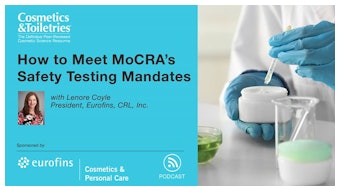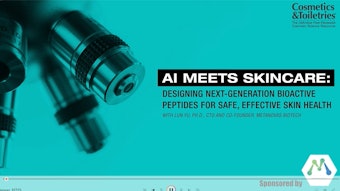
Editor's note: The "Words from Wiechers" series considers the many lessons the cosmetics R&D industry can learn from the late Johann Wiechers, Ph.D. He was a critical thinker, adviser, colleague and leader in the industry until his unexpected passing. Presenting Wiechers's insights is IFSCC Education Chair Anthony J. O'Lenick, Jr.
This month, we review chapter 41, "One Way Communication..." in Wiechers's Memories of a Cosmetically Disturbed Mind. In this chapter, Wiechers challenges us to consider how we gather the market need for products as we start the formulation process. Again, in his typical style, Wiechers makes a comment so simple it seems as though it need not be said: Sell to customers.
While the concept is simple, the implications are profound. He says, “If we want to sell, should we not be talking to our customers, the user of our products, instead of to each other?” Put another way: How can we gauge customer expectations about what makes a product successful if we do not listen carefully to their demands?
Wiechers says: I want to talk this time about communication as I have been wondering a lot about this lately. We communicate a lot, we organize conferences and we talk to each other. We fill an enormous number of cosmetic journals and cosmetic magazines and cosmetic periodicals with our writings that, strangely, are also read by cosmetic people like yourself, but are you buying my products? If we want to sell—and what is the objective of any industry when push comes to shove—should we not be talking to our customer, the user of our products instead of to each other?
A knowledge vacuum will be filled by any (mis)information if the correct information is not provided.
Educating Consumers
We also need to provide information on our products that educate our customers. A knowledge vacuum will be filled by any (mis)information if the correct information is not provided. We as scientists need to provide our journalistic associates information that is correct and up to date.
Wiechers states: Most journalists are not cosmetic scientists and therefore we do not tell them the correct information because 'they would not understand it anyway.' So, they will start looking for themselves because there is a story in the air and it needs to be written. They would like to have the correct information, but we are not willing to give it to them, simply because 'they would not understand.'
Is it that when you failed everything in school you can still become a journalist? These people are not stupid but sometimes write 'stupid' things simply because we as an industry do not want to give them the correct information. We as cosmetic scientists need to stand up and take the time to explain things to them. Journalists can be our best friends and it is perfectly OK for them to be critical. Even better, you should want them to be critical. If we would start telling these people what we really do to make better products every day, don’t you think that they would write differently?
I suspect that much of the misinformation in our industry is the result of chemists not providing the technical information to justify conclusions, and the journalist needs to publish that data.
It is my opinion that our journalist associates are not stupid, nor are we as chemists lazy. I suspect that much of the misinformation in our industry is the result of chemists not providing the technical information with the needed support data to justify conclusions, and the journalist needs to publish that data. It amazes me how little hard data is published on topics of great concern.
(Editor's note: On this note, Cosmetics & Toiletries welcomes your technical article submissions. Please email them to [email protected].)
The Lesson
Many in our industry have well-formed, intransient ideas on a variety of topics but if you ask for the scientific data needed to justify it, everything breaks down to merely an opinion. As simple a concept as biodegradability gets endless discussion, but when did you last see the study actually run, with data made available? We as chemists and journalists need to be more skeptical of unsupported conclusions and demand the data.
As far as talking to our customers, this is critical step. The most basic question is: What do our customers expect of a cosmetic product? As I have said before, a cosmetic product is not a drug and should not be subjected to drug expectations. If you buy a drug, you have a right to expect it will cure the disease that needs to be cured. But where is the harm if a cosmetic product has properly supported cosmetic claims and provides pleasure to our customer (who is properly using it), to say, eliminate the appearance of wrinkles? Our customers find our cosmetic products are pleasurable and functional, otherwise we would not have repeat customers.










